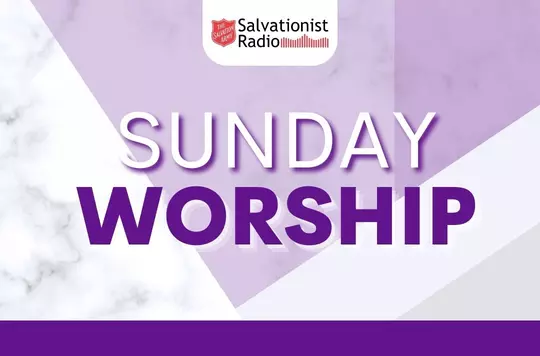28 August 2025
Matthew 5: Let your light shine!
Major Elizabeth Turner
Major Elizabeth Turner encourages us to make a difference in the darkness of our world.
Key texts
As a child, I would gaze in awe at stars sprinkled across an inky-blue night sky, darkness allowing me to see their captivating presence, twinkling unendingly.
Standing in the safety of my garden, darkness held no fear for me, only a sense that I was surrounded by breathtaking beauty; I was in the very presence of God. However, more sinister tones of darkness pressed in on wintry nights as I hurtled through an alley, bound for singing or band practice. Shards of glass and plastic crunched underfoot. The lamp that should illuminate the alley was – again – vandalised. For me, darkness without light was intolerable. With hammering heart I sped on, comfortingly familiar words of Psalm 23 filling my mind.
Pause and reflect
- Reflect on your experiences of light and darkness.
- How did you feel in those times?
Matthew 5:14 is anchored in a collection of Jesus’ teachings known as the Sermon on the Mount. Seeing the crowd, Jesus climbed the mountainside and sat down, signalling his intention to teach. His disciples drew nearer and a curious crowd, wanting to hear what Jesus had to say, closed in behind them. Having described a series of circumstances where blessings abound, though perceptions point otherwise, Jesus provides illustrations of the character of a believer.
You’ll be familiar with the exclamation: ‘What are you like!’ This usually sarcastic expression implies someone has acted oddly or shared an opinion thought of as quirky, or maybe ‘not how I would have acted or expressed the matter’.
Of course not! We are unique beings, each with something to bring to generate interest and bring greater understanding of the diversity of God’s wonderful creation.
In Matthew 5:13–15, Jesus tells his hillside congregation and us readers what his people are like: salt adding flavour, stopping the rot; light exposing all that’s around – clean or filthy – illuminating dead ends and pathways. For the Christian, ‘What are you like!’ could become a positive prompt.
Pause and reflect
- How do you respond to Jesus describing you as salt, light and a town on a hill?
- How do you bring these qualities to situations you encounter?
Christians may feel a little bashful about being a light. They might say, ‘Well, it’s not me that’s light – it’s Jesus who’s the real light.’ Indeed, Jesus is the ultimate source of light. Scripture tells us: ‘God is light; in him there is no darkness at all’ (1 John 1:5). Jesus’ light draws people to him. Even so, he comfortably navigates the darkness to seek his lost ones (see Psalm 23:4 and Psalm 139:12). Yet Jesus calls his people light.
In her book The Light We Carry, Michelle Obama considers that everyone, by virtue of their character and gifting, is a light to be noticed, drawn towards, warmed and enriched by. She writes: ‘It’s natural for kids to want others to recognise their light. They crave it. They grow with it. And if they’re made to feel invisible, they will often find other, less productive ways to be seen. They’ll act out inside the darkness they’ve been left with.’ It’s a good observation.
Recall the Aaronic Blessing in Numbers 6:24–26. ‘The Lord make his face shine on you… the Lord turn his face towards you and give you peace.’ God’s face lights up when he sees us. We are loved and accepted, and in recognising this, it’s life affirming. We who love God should present that validating light, that life-affirming face, towards everyone we encounter.
Looking at the intently listening faces turned towards him, Jesus reminds the largely Israelite crowd of their history. They are to be God’s light to other nations (see Isaiah 42:6).
For those able to see, a light that’s aglow can’t not be noticed. A town on a hill stakes its claim on the land, advertising strength, solidity and security. It’s intentionally visible for miles. Its inhabitants dwell in peace and safety, comforted by that which surrounds them. If they come under attack, their structure could withstand the onslaught.
That’s what the Israelites as a nation were to be like: foundationally strong and secure on God. Those who choose likewise may know this reality too. Living according to God’s word, a person’s poise is strong and secure, visibly different from the shakiness of lives built on other ideologies (see Matthew 7:24–27). From town dwellings, lights stream from windows, presenting an appealing sight. For the one outside, a yearning may grow, wanting that place to be their home too.
As a nation, God’s people were to be like that always. And in that moment, by their position on the mountain with Jesus, they were that town, turning heads of those walking around below. What was happening up there? The sight either caused others to clamber up, or back away. Being that commanding structure on a hilltop, those shining lights from within were now being embodied by their connection with Jesus.
When Moses had been with God, the people were afraid of his radiant face and wanted it covered (see Exodus 34:29–35). Stephen’s face grew angelically luminous as he preached before he was stoned to death (see Acts 6:15). In the same way, our relationship with Jesus – who is the power source of light, the strength in the fabric of the building – is evident, always visible, and dynamically so.
Are we willing to be conduits of Jesus’ life-giving presence?
Bible study by

Major Elizabeth Turner
Assistant Retired Officers Secretary, THQ
Discover more

Captain Ian Hammond explores God’s solution to dispel the darkness of our world.

Captain Vanessa Coleman reminds us that discovering Jesus dispels our fear.

Captain Julia Mapstone (Dublin South) reflects on radiating the light.

Commissioner Paul du Plessis considers the light of the Saviour in today’s dark world.
